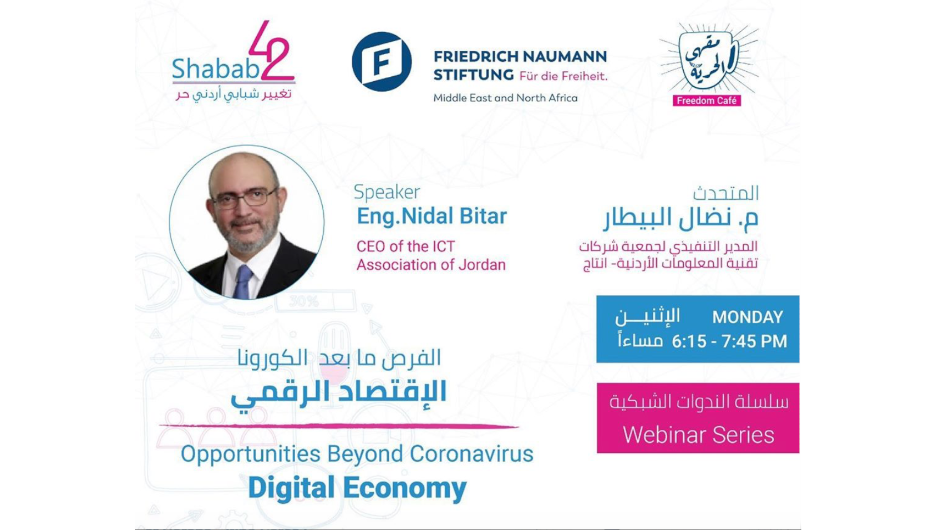Opportunities Beyond Corona: Digital Economy

The coronavirus pandemic has been creating challenges to every aspect of the world we know, but has it also led to any new opportunities? Along with Shabab42 and the Friedrich Naumann Foundation for Freedom, The Freedom Café has started a series of online seminars to dissect and analyze the COVID-19 challenges while also examining its opportunities. The series of webinars tackles all aspects of our lives that are being affected by the coronavirus pandemic, including the economic, political, and social ones.
Our first webinar was held on April 6th, 2020 and took a closer look at the digital economy in Jordan with our expert guest Mr. Nidal Bitar, CEO of Intaj Group. What is a digital economy? In what ways does it differ from the traditional economy? And how fast can we switch to it depending on the digital economy post-coronavirus crisis?
Digital economy, as Mr. Nidal explained, creates changes to our daily lives. We find it in all sectors such as industry, trade, agriculture, tourism, education, and health to name a few. Digital economy has a services and informational basis, allowing for international competition based on research, creativity and the ability to adapt. It enables collaboration and intersections between different sectors. On the other hand, traditional economy has an industrial basis, local competition based on decreasing costs and provides limited collaboration with stakeholders. Regarding Jordan’s readiness to switch fully to a digital economy, Mr. Nidal remarked that this depends on creative human capital, on information technology and the infrastructure of telecommunication, as well as on people’s digital literacy which are all readily accessible.
Many success stories have been observed during this crisis. Intaj Group, for example, had started a SheTech 3-month Bootcamp for females in Amman and Karak. The lockdown was just prior to their final assessments, therefore their assessments had to be done online where these females presented their programming, cybersecurity and AI projects in front of virtual juries. This time-saving, distance-saving method was accessible prior to the lockdown but was not recommended, and now became obligatory. Also, we have all observed the online studying platform “Darsak” by the Ministry of Education which 70% of the Jordanian students now use. This is a high percentage since we are considering not just western Amman, but even remote areas across Jordan. The other 30% depend on the TV channels also provided by the ministry.
The health crisis we’re going through has direct effects and can lead to an economic crisis. One of the most prominent challenges is that of an informal economy. Day laborers can’t afford to feed their families due to the lockdown. There are existing funds like the National Aid Fund that assist partially in aiding these families. However, tools and technologies can be used to help reach these people. Many ideas have been proposed by information technology companies to find solutions to challenges facing the informal economy; some are being studied and others are already being implemented. “Technology is no longer a luxury; it is an industry that relates all other industries.”
More opportunities will be provided in cybersecurity and other technologic fields that handle data, as more sectors will be driven to use clouds to retain their data after the lockdown, where as currently, many companies’ data is stored away in their offices.
Mr. Nidal additionally stressed on the utilization of financial inclusion through e-wallets, which are already established in Jordan but their need became further recognized during this lockdown. E-wallets will become readily available in the post-coronavirus period. Keeping in mind that paper money is very contractible to viruses and diseases. The majority of Jordan’s population however depends on cash and less than 35% of the population are bankable. The government’s goal is to switch into a cashless society.
“Post-corona won’t be the same as pre-corona”, stated Mr. Nidal as he believes that just as our social habits will surely change, so will e-commerce and online learning. Online learning will be supplementary to the traditional learning, but e-commerce will thrive. Moreover, this crisis has proven that working from home can be doable and as efficient as working from the office, especially for IT services. This will allow small business to rent smaller offices, decrease costs of transportation, water and electricity and maintain their productivity. Working remotely also includes working from someone’s own governate, thus decreasing the influx from the governates into Amman.
Finally, Mr. Nidal stressed on the vital role of individuals in this crisis. He urges them to stay home for themselves and their country, to upgrade their personal skills in their field of expertise, and to keep up with the many online initiative and hackathons that can help utilize one’s creativity in solving the challenges we’re facing.
This article was written by FNF Alumna Deema Al-Bakri. Read about her below: